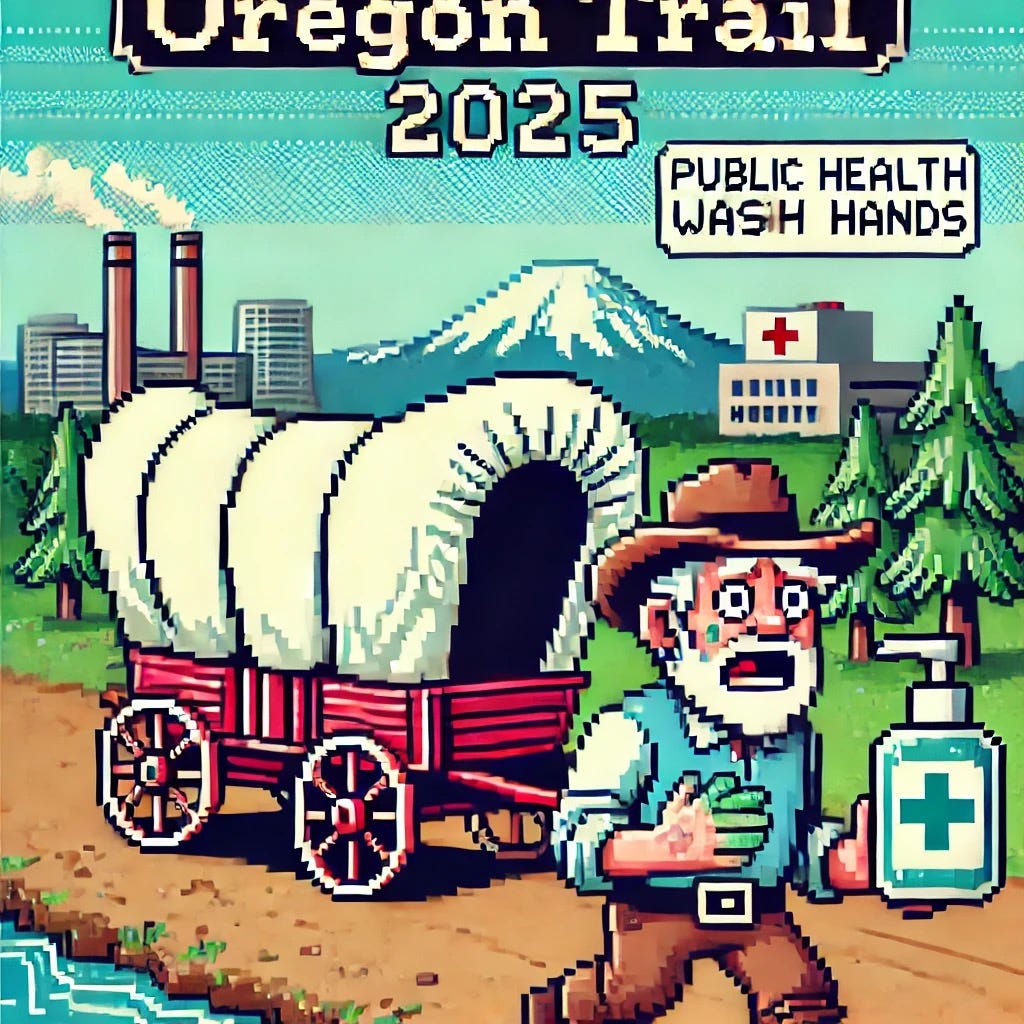Oregon Trail 2025: You Have Died of Dysentery—Again
Ah, the Oregon Trail—that beloved computer game where you spent hours guiding your pixelated pioneers westward, only to watch in horror as they contracted dysentery and died a humiliating, poop-related death. Good times.
Well, guess what, folks? Oregon is bringing the game to life! The state is currently dealing with an outbreak of Shigella, the bacteria responsible for shigellosis—a delightful intestinal illness that, yes, can lead to full-blown dysentery (1).
A Blast from the Poop-Filled Past
Since 2012, cases of dysentery have been on the rise in Oregon (2), proving that history repeats itself in the worst possible ways. Things took a turn for the worse in 2024, when two separate strains of Shigella decided to throw a gut-wrenching party across Multnomah County and the Portland Metro area (3). Now, in 2025, the bacterial bonanza continues, because apparently, we haven’t suffered enough.
Currently, there are 197 cases nationwide, with a whopping 61% concentrated in Multnomah County (4). So, if you thought hunting for buffalo and crossing rivers were the deadliest parts of the Oregon Trail, think again. The real danger is the bathroom situation.
How Are People Catching This?
Unlike the game, where your only risk factors were drinking bad river water and making terrible wagon decisions, today’s Oregonians have several exciting new ways to contract dysentery:
• Intimate contact, including sex (nothing says romance like gastrointestinal distress) (5).
• Unhoused and housing-insecure individuals (because public health crises always hit the most vulnerable hardest) (6).
• Drug use among social groups (Shigella doesn’t discriminate, but it does like to party) (7).
• International travel to lower-resource countries (only about 20% of cases, so don’t go blaming this on someone’s vacation) (8).
Unlike a self-contained food poisoning outbreak, where we can all collectively point fingers at a sketchy taco truck, Shigella is spreading directly between people (9). So, if you were hoping to avoid it by just not eating at Chipotle for a few weeks—sorry, it’s not that simple.
Symptoms: How to Know If You’ve Joined the Oregon Trail Death Club
If you suddenly feel like you’re living inside an 8-bit horror game, look for these signs:
• Diarrhea (sometimes bloody, because nature is cruel) (10).
• Fever (as if you weren’t already sweating enough) (11).
• Stomach cramps (enjoy that fetal position, buddy) (12).
The good news? Most people recover within a few days. The bad news? If you’re young, old, malnourished, or dehydrated, it can be life-threatening (13). So, hydrate like your life depends on it—because it kind of does.
How to Avoid an Unfortunate Tombstone
The classic “You have died of dysentery” might have been hilarious in 1990s computer labs, but in real life? Not so much. To avoid becoming a modern-day Oregon Trail cautionary tale, follow these simple rules:
• Wash your damn hands. Frequently. With soap. Like, a lot (14).
• If you have diarrhea, don’t prepare food for other people. (This shouldn’t need to be said, but here we are) (15).
• Avoid swimming in lakes, ponds, or untreated pools. Or just assume all natural bodies of water are out to get you (16).
• Dispose of diapers properly. If you don’t have kids, congratulations—one less thing to worry about (17).
• Don’t have sex with anyone who’s had diarrhea recently. (Again, this should go without saying, but apparently, it needs to be a bullet point) (18).
• If you work in food service, childcare, or healthcare, don’t go back until you test negative. Because nobody wants a side of Shigella with their burger (19).
For those experiencing homelessness, the Multnomah County Health Department is stepping in with short-term housing, which is one of the best ways to prevent further spread (20).
Game Over? Not Quite.
We may not be fording rivers in covered wagons anymore, but one thing remains the same: dysentery is still out there, waiting to ruin your day. Oregon’s health officials are working on it, but in the meantime, don’t make the same mistakes your pixelated ancestors did.
Wash up, stay cautious, and for the love of all things sanitary—don’t become the next tragic headline.
Otherwise, you might just wake up one morning to find the ominous words flashing before your eyes:
“You have died of dysentery.”
Sources:
(1) Mayo Clinic, “Shigella Infection: Causes and Symptoms.”
(2) Oregon Health Authority, “Shigella Trends in Oregon, 2012-2025.”
(3) Multnomah County Health Department, “2024 Shigella Outbreak Data.”
(4) CDC, “National Shigella Surveillance Report 2025.”
(5) Fox News, “Shigella Outbreak Spreads Through Intimate Contact.”
(6) Multnomah County Public Health, “Impact of Housing Instability on Disease Spread.”
(7) Oregon Public Broadcasting, “Shigella Cases Rising Among Drug-Using Social Groups.”
(8) WHO, “Shigella Transmission and Travel Risks.”
(9) CDC, “Person-to-Person Transmission of Shigella.”
(10) Cleveland Clinic, “Dysentery: Symptoms and Treatment.”
(11) Mayo Clinic, “Common Symptoms of Shigellosis.”
(12) Oregon Health & Science University, “Shigella: A Growing Concern in the Pacific Northwest.”
(13) CDC, “Shigella Complications in High-Risk Populations.”
(14) WHO, “The Importance of Hand Hygiene in Disease Prevention.”
(15) Multnomah County Health Advisory, “Shigella Prevention Strategies.”
(16) Oregon Department of Environmental Quality, “Waterborne Disease Risks in Oregon.”
(17) American Academy of Pediatrics, “Diaper Hygiene and Disease Prevention.”
(18) CDC, “Sexually Transmitted Diseases and Gastrointestinal Infections.”
(19) FDA, “Food Safety Guidelines for Employees with Illness.”
(20) Multnomah County Homeless Services, “Short-Term Housing as a Disease Mitigation Strategy.”



